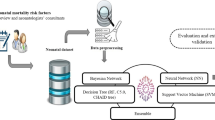Abstract
With development in the area of electronics and artificial intelligence (AI), medical devices (MD) have been sophisticated as well. MD management strategies today are very different than decades ago, so it is reasonable to consider how we can prepare for where we are going in the future. This paper presents the result of application of machine learning (ML) techniques in management of infant incubators in healthcare institutions. A total of 140 samples was used for development of Expert system based on ML classifiers. These samples were collected during 2015–2017 period, as part of yearly inspections of incubators in healthcare institutions by ISO 17020 accredited laboratory. Dataset division 80–20 was used for classifiers development and validation. Performance of the following machine learning algorithms was investigated: Naïve Bayes (NB), Decision Tree (DT), Random Forest (RF), k-Nearest Neighbour (kNN), and Support Vector Machine (SVM). Resulting classifiers were compared by performance and classifier based on Decision Tree algorithm yielded highest accuracy (98.5%) among other tested systems. Obtained results suggest that by introducing ML algorithms in MD management strategies benefit healthcare institution firstly in terms of increase of safety and quality of patient diagnosis and treatments, but also in cost optimization and resource management.

Similar content being viewed by others
References
CIA – The World Factbook Life Expectancy At Birth. Available at: https://www.cia.gov/library/publications/the-world-factbook/rankorder/2102rank.html
United Nations Department of Economic and Social Affairs (29 July 2015). "United Nations World Population Prospects: 2015 revision”.
Sharareh Taghipour, Dragan Banjevic and Andrew K. S. Jardine, reliability analysis of maintenance data for complex medical devices.
Badnjević A, Cifrek M, Magjarević R, Džemić Z, (2018), Inspection of medical devices for regulatory purposes, series in biomedical engineering ISBN 978-981-10-6649-8.
Gurbeta L, Izetbegović S, Badnjević-Čengić A. Inspection and testing of infant incubators. In: Badnjević A, Cifrek M, Magjarević R, Džemić Z, editors. Inspection of medical devices. Singapore: Series in Biomedical Engineering. Springer; 2018.
Badnjevic A, Gurbeta L, Jimenez ER, Iadanza E. Testing of mechanical ventilators and infant incubators in healthcare institutions. Technol Health Care. 2017;25(2):237–50.
Gurbeta L, Dzemic Z, Bego T, Sejdic E, Badnjevic A. Testing of anesthesia machines and defibrillators in healthcare institutions. J Med Syst. 2017:41, 133. https://doi.org/10.1007/s10916-017-0783-7.
Gurbeta L., Dzemic, Z., Badnjevic A., Establishing traceability chain of infusion and perfusor pumps using legal metrology procedures in Bosnia and Herzegovina, IUPESM – The World Congress on Medical Physics & Biomedical Engineering in Prague, June 3—8, 2018.
Gurbeta L, Badnjević A. Inspection process of medical devices in healthcare institutions: software solution. Health Technol. 2017;7(1):109–17. https://doi.org/10.1007/s12553-016-0154-2.
Gurbeta L., Badnjević A., Kurta E. (2020) eVerlab: Software Tool for Medical Device Safety and Performance Inspection Management. In: Badnjevic A., Škrbić R., Gurbeta Pokvić L. (eds) CMBEBIH 2019. CMBEBIH 2019. IFMBE proceedings, vol 73. Springer, Cham.
Das S, Dey A, Pal A, Roy N. Applications of artificial intelligence in machine learning: review and Prospect. International Journal of Computer Applications. 2015;115(9):31–41.
Horvitz, E. (2006) Machine learning, reasoning, and intelligence in daily life: directions and challenges. USA.
Beam AL, Kohane IS. Big data and machine learning in health care. Jama. 2018;319(13):1317–8.
Badnjevića A, Pokvić LG, Hasičić M, Bandić L, Mašetić Z, Kovačević Ž, et al. Evidence-based clinical engineering: machine learning algorithms for prediction of defibrillator performance. Biomedical Signal Processing and Control Volume. 2019;54:101629.
L Spahić, E Kurta, S Ćordić, M Bećirović, L Gurbeta, Z Kovacevic, S Izetbegovic, A Badnjevic, Machine learning techniques for performance prediction of medical devices: infant incubators. In: Badnjevic A., Škrbić R., Gurbeta Pokvić L. (eds) CMBEBIH 2019. CMBEBIH 2019. IFMBE proceedings, vol 73. Springer, Cham.
ESA620 Electrical Safety Analyzer by Fluke Biomedical. Available at: https://www.flukebiomedical.com/products/biomedical-test-equipment/electrical-safety-analyzers/esa620-electrical-safety-analyzer
INCU incubator analyser by Fluke Biomedical. Available at: https://www.flukebiomedical.com/products/biomedical-test-equipment/incubator-radiant-warmer-analyzers/incu-incubator-analyzer
Traceability pyramid. Available at: https://www.isobudgets.com/measurement-traceability-complying-iso-17025-requirements/
International Electrotechnical Commission, IEC 62353, available at: https://webstore.iec.ch/publication/6913
Novakovic J, Strbac P, Bulatovic D. Toward optimal feature selection using ranking methods and classification algorithms. Yugoslav journal of operations research. An International Journal Dealing with Theoretical and Computational Aspects of Operations Research, Systems Science, and Management Science. 2011;21(1):119–35.
Guidi, G., Pettenati, M. C., Miniati, R., & Iadanza, E. (2013). Random Forest for automatic assessment of heart failure severity in a telemonitoring scenario. Conference Proceedings: ... Annual International Conference of the IEEE Engineering in Medicine and Biology Society. IEEE Engineering in Medicine and Biology Society. Conference , 2013, 3230–3233.
LD Mustafić, L Gurbeta, A Badnjevic-Cengic, A Badnjević, BB Hukeljić, Diagnosis of Severe Aortic Stenosis Using Implemented Expert System, International Conference on Medical and Biological Engineering, 149–153.
Alić B, Gurbeta L, Osmanovic A, Badnjević A. "machine learning techniques for classification of diabetes and cardiovascular diseases," 2017 6th Mediterranean conference on embedded computing (MECO). Bar: Montenegro; 2017, pp. 1-4. https://doi.org/10.1109/MECO.2017.7977152.
Machine Learning Healthcare Applications – 2018 and Beyond, available at: https://emerj.com/ai-sector-overviews/machine-learning-healthcare-applications/
Shaikhina T, Lowe D, Daga S, Briggs D, Higgins R, Khovanova N. Decision tree and random forest models for outcome prediction in antibody incompatible kidney transplantation. Biomedical Signal Processing and Control. 2017. https://doi.org/10.1016/j.bspc.2017.01.012.
Zhang, Z. (2016). Introduction to machine learning: k-nearest neighbors. Annals of Translational Medicine, 4(11), 218–218.
Calix, R., & Sankaran, R. (2013). Feature ranking and support vector machines classification analysis of the NSL-KDD intrusion detection corpus. TwentySixth International Florida Artificial Intelligence Research Society Conference.
Author information
Authors and Affiliations
Corresponding author
Ethics declarations
Conflict of interest
The authors declare that they have no conflict of interest.
Ethical approval
This article does not contain any studies with human participants or animals performed by any of the authors.
Informed consent
Not relevant for this work.
Additional information
Publisher’s note
Springer Nature remains neutral with regard to jurisdictional claims in published maps and institutional affiliations.
Rights and permissions
About this article
Cite this article
Kovačević, Ž., Gurbeta Pokvić, L., Spahić, L. et al. Prediction of medical device performance using machine learning techniques: infant incubator case study. Health Technol. 10, 151–155 (2020). https://doi.org/10.1007/s12553-019-00386-5
Received:
Accepted:
Published:
Issue Date:
DOI: https://doi.org/10.1007/s12553-019-00386-5




